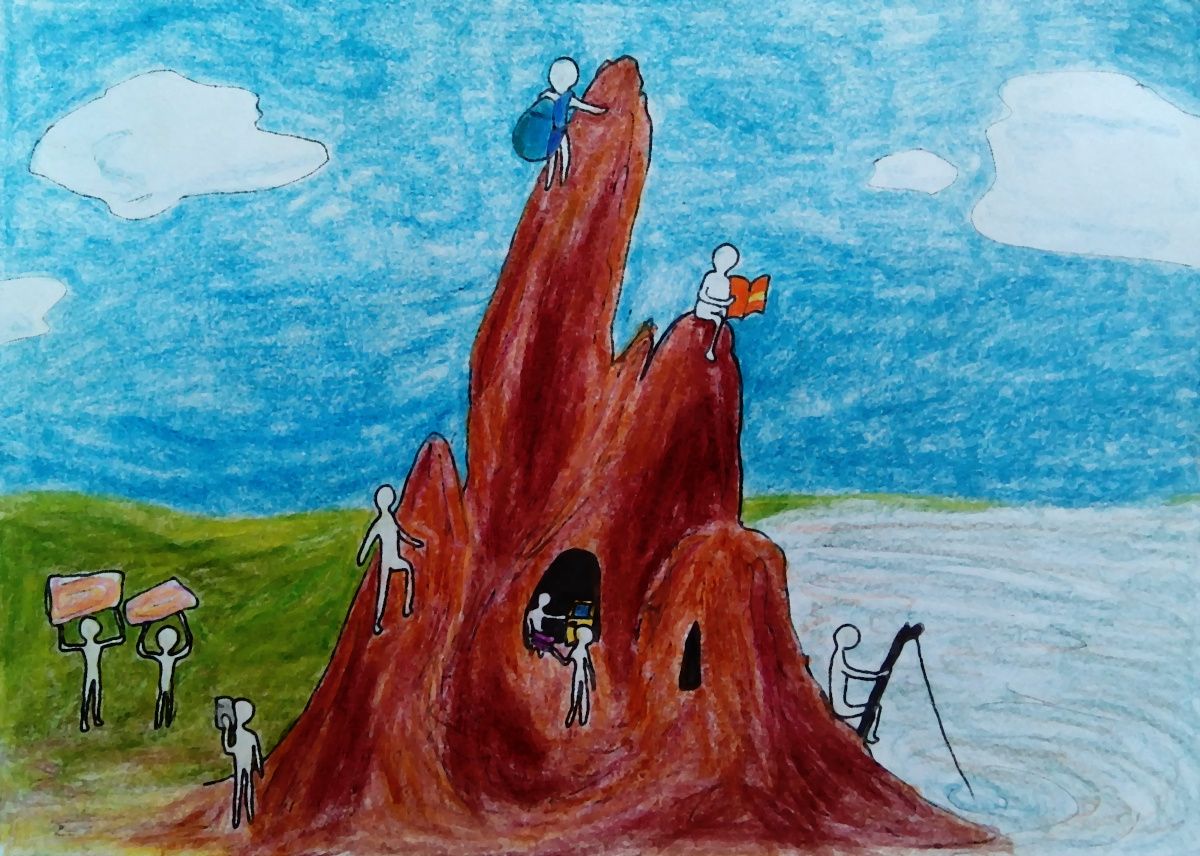Grounded
Screen time, survival, and the need for human connection.

Screen time, survival, and the need for human connection.
Back when Snipette was just a two-person show churning out articles every week, we had an author cancel on us the day before his piece was due to be published. It left us stumped — we had just hours before something needed to go up. What now? The answer, of course, was for me to work into the night and pull something together out of my ongoing drafts so that we would be able to meet our then 7:00am publishing deadline.
Around 2 in the morning, my father wandered out of his room, bleary-eyed. “What are you doing?” he asked me, and I explained the situation. “Don’t stay up too late. We’ll talk in the morning.”
The talk in the morning, as it turned out, was a lecture on how I wasn’t meant to take advantage of my access to gadgets. My parents had decided for me that limiting my exposure to the internet was a more important priority than one missed article — which they could, because I was in middle school at the time. Obviously, I disagreed.
I didn’t matter; my internet “privileges” were taken away for one week anyhow.
Now, this wasn’t a particularly unusual occurrence, and I’m sure many of you have been there, too. Whether you got in trouble at school, or weren’t studying enough, or were staying up too late — it’s likely your parents imposed some such punishment on you.
"Give me your phone."
"Go up to your room."
"No Instagram for one week."
I’ve faced various versions of these punishments many times during my childhood years. They’re widespread because they’re so effective. But what is it, exactly that makes them effective?
It was also in middle school that I first read about Darwin’s survival of the fittest, the theory that proposes that evolution is advanced by individuals who for some reason are uniquely suited to their situation, allowing them better access to the resources necessary to survive and reproduce.
The first hominin to stand up on two legs and become bipedal had an advantage because they could walk longer distances more efficiently and find more food. The first Homo sapiens that could digest milk into adulthood were able to take advantage of a highly calorie-dense source of nutrition, and better survive intense European winters than their peers.
And this extends to beneficial qualities too: being able to pick up on a skill quickly, for example, would have helped a Neanderthal survive better. In fact, it’s a big part of the reason why there was such a leap in human progress after we began crafting tools.
In short: the individual is optimised for survival.
A couple months ago, as I popped by the ATM on my way to the shops, an older lady stopped me and asked for help in withdrawing cash. Of course, I stopped to help her out and explained the touchscreen interface so she’d know what to do next time.
An unremarkable anecdote, all things told. I’m willing to bet that any reader in that situation would have done the same. In fact, we all do nice things for other people all the time. We help neighbours with their groceries and blind people crossing the street and give random strangers directions to places they want to go. We smooth the way for other people, without ever getting anything out of it at all, and perhaps even sacrificing momentarily for ourselves.
While what I did wasn’t extraordinary, I would argue that the extraordinariness of it all lies in how ordinary helping others is for us. If all we cared about was survival, would we still do those same nice things?
The truth is, we care about other people, too. We can, and do, bring ourselves to put someone else first — even if it’s just a random stranger.
And there’s an explanation for why: maybe it’s because survival of the fittest relates to the group and not the individual. One man by himself isn’t particularly going to do much for the future of the species, but a group? A group can do a lot.
Think of a nest of termites, for instance. It may contain thousands of little insects, all scurrying about to do their work. One termite on its own? Would be dead in hours, if not minutes. But all together, they’re an absolutely unstoppable force.
We help each other through tough times because we have people of different skills doing different things. In the end, everything comes together, and we move forward as a group — or as a society.
As a kid, I hated being grounded. I missed my friends; I missed being able to sit around and play Monopoly Deal for hours; or, if it was online, I missed my email-correspondence friends and hearing about their latest adventures in train stations and post offices. There was a distinct sense that something was missing from my day when they weren’t a part of it.
This isn’t just me.
People are wired to be with other people. It’s the reason some psychologists oppose solitary confinement in prison, describing it as “tantamount to torture”. Even those who are used to and mentally prepared for some amount of “alone time” find it difficult.
When he signed up for a reality show involving being in the woods by himself for several days, survivalist and nature enthusiast Alan Kay thought he knew what he was getting into. For him it was an average Bear Grylls-style endeavour. Get in, get surviving, get out.
But there was one element he hadn’t anticipated that complicated things: he was alone. “Everything is more difficult,” he told reporters later. “Even going to the loo.”
Kay did okay for the first week or so. Then, he began anthropomorphizing objects unconsciously, and having hour-long conversations with logs and rocks. A week after that, he began hallucinating and then he would get physically sick.
In the end, he made it through 56 days alone. But at what cost?
You may have heard of the chemical oxytocin, also known colloquially as the love hormone. It’s primarily responsible for the feelings of “bonding” we experience with loved ones when we spend time together. When you’ve had a relaxing family dinner, for example, or a playfully argumentative game of Monopoly — this is what makes you feel good.
But recently, scientists have come to find that we also receive small doses of oxytocin from all kinds of human interaction: not just that with people we already know and love. So the little exchange with the cashier at the supermarket? Or saying hello to the doorman as you leave for the day?
Oxytocin, oxytocin, oxytocin.
And it’s these tiny little doses that we receive throughout the day that boost our serotonin levels. Serotonin, which you may have heard called the “feel-good” hormone, is important in regulating our moods and ensuring we don’t feel too low.
So it isn’t just that we care about people: we need them to survive.
When the COVID-19 pandemic hit, many of us had to go into lockdown alone with none of the usual socialising and human contact that made up our day-to-day lives. Everyone was, in effect, grounded.
Or not. For me, lockdown meant attending classes and submitting homework online — for which my parents had to, obviously, drastically increase my allowed screen time. With social interactions moving online too, the last barriers fell away, and “being online” changed from a closely monitored occupation to something I could do pretty much whenever I felt like.
It wasn’t just me: looking back, I can see the dramatic shift that took place among all my peers. There’s the time before the pandemic, when everyone’s access to devices was strictly timed and monitored by parents; then there’s the time after, when video calls are the norm and the Internet has all but become a basic human right.
In some ways, the pandemic-driven shift to online has made things much more convenient. Work meetings, game nights, movie watch-alongs — you name it, we got it, even if it’s among people scattered in various parts of the world. At Snipette, we switched from multiple text conversations happening hectically in parallel, to a weekly video meeting where the now growing team could get together and take stock. Rather than staccato strings of text, we could see each other, share screens, and (most importantly) have a bit of fun!
And yet, that didn’t quite solve everything.
The COVID-19 pandemic came paired with a massive mental health crisis around the world. Psychologists saw a 25% spike in cases of anxiety and post-traumatic stress, as well as a 32% spike in cases of major depressive disorder.
Being alone took a toll on people. It may very well have taken a toll on you.
Although Zoom calls and Netflix parties were and are an easy method of connecting over distances, they don’t quite provide the same kind of chemical happiness that real live human interaction does. And in a world where many of our friends are online, it’s possible we’ll have to get by on less and less.
About three weeks back, I began experimenting with leaving my phone behind in my room, just to see what would happen. A short errand, a visit to the reading room in my college library, a late night walk with a friend — small outings that didn’t quite need me to stay connected or check my phone every few minutes. And it’s been going well.
Not having the option to be pulled into Instagram, and having to be present in whatever I’m doing? It feels great.
Perhaps there’s only so much screen time we can handle. Too much of a good thing, and all that; not to mention fatigue, eye issues, and a host of other problems that could arise. The world has changed to such an extent that one can’t get by without a good microphone and webcam, but at least we can take a step back from all our interactions and ask: are we getting enough out of it to fulfil our need for connection?
The world is smaller, but it’s more distant than ever. Perhaps, as we grow older, what we need to stay grounded is the exact opposite of what “being grounded” meant to us as children.
